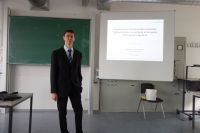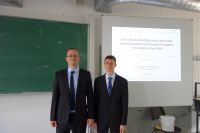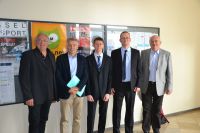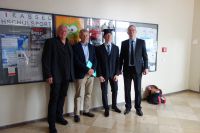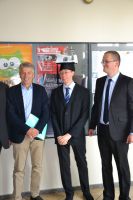Today I attended the PhD thesis defense of Mr. Stefan Niemczyk of the Distributed Systems Group, Fachbereich 16: Elektrotechnik/Informatik of my old university, the University of Kassel, in Germany as the second reviewer and referee. First of all, congratulations to Mr. Niemczyk for the successful defense of his thesis, rated with "very good". The title the thesis is "Dynamische Konfiguration verteilter Informationsverarbeitung in Gruppen heterogener Agenten," which translates to "Dynamic Configuration of the Distributed Information Processing in Groups of Heterogeneous Agents". I can only recommend reading this excellent work to everyone working with teams of (autonomous) robots.
I think this research is not just relevant in the search-and-rescue scenarios in which it was tested, but may also be helpful when designing robots for, e.g., home service robots, the internet of things applications, automated logistics, warehouse management, or for constructing buildings. This technology could thus become an important asset in a later phase of an Industry 4.0 or Made in China 2025 concept, when intelligent production environments are highly automated and exchange goods and material via automated logistic processes and, thus, need to be able to configure their "interface robots" dynamically to each other.
The Distributed Systems Group
 The Distributed Systems research group of the University of Kassel in Germany addresses in teaching and research a broad spectrum of distributed computing topics. Its subjects range from theoretical foundations to applied system and software engineering issues. Its current research areas are the design and implementation of context-aware and adaptive distributed systems, cooperative autonomous robots, socially aware computing, and service-oriented architectures.
The Distributed Systems research group of the University of Kassel in Germany addresses in teaching and research a broad spectrum of distributed computing topics. Its subjects range from theoretical foundations to applied system and software engineering issues. Its current research areas are the design and implementation of context-aware and adaptive distributed systems, cooperative autonomous robots, socially aware computing, and service-oriented architectures.
English Abstract Translation (unauthorized, done by me)
In order to act successfully, multi-agent systems (MAS) need a comprehensive and high-quality knowledge base. The knowledge base comprises the information needed by an agent, which are created by processing sensor information. The adaptation of the information processing to the application domain allows for guaranteeing the quality of the knowledge base and, thus, to increase the performance of the MAS. Today, middlewares support the integration of contemporary methods and approaches for information processing. An adaptation to an application domain with properties unknown at the time of the development is, however, hardly possible.
This dissertation thesis explicitly addresses the variability of domains with such properties which are unknown at the time of system development. It offers a method for configuring the information processing in dynamic groups of heterogeneous agents. The starting point is the definition of an OWL ontology, which provides a comprehensive vocabulary for the semantic description of the components relevant for the information processing. Based on the semantics modelled in this ontology, a model with all context relevant for the information processing of an agent can be generated at runtime. For representing this runtime model as well as for the deduction from this knowledge, we use Answer Set Programming (ASP), a modern approach for complex combinatorial search problems. The developed ASP program analyzes the runtime model and generates and optimized configuration of the information processing which is adapted to the current situation. This configuration describes the selection of information sources as well as the concatenation of information processing steps. For the optimization of the configuration, both the information quality as well as framework conditions are considered. The integration of new information sources discovered at runtime is supported by two mechanisms for transforming information between heterogeneous representations: These are an XML-based transformation language as well as a synthesis of transformations on basis of the modelled knowledge. Both mechanisms allow for the addition of new transformations or external services without recompilation or restarting of the software. An implementation of the methods is provided in form of the ICE Middleware. ICE is designed for dynamic groups of agents and supports a configuration of information processing of coalitions formed at runtime. The evaluation shows that the introduced new method for the dynamic configuration of the information processing can enable an adaptation to new, previously unknown environments and can deal with un-anticipated events. Moreover, the evaluation of the required runtime and memory also shows that the ICE Middleware can be used on systems with limited resources.
Original German Abstract
Das erfolgreiche Agieren von Multiagentensystemen (MAS) setzt eine umfangreiche und hochwertige Wissensbasis voraus. Die Wissensbasis umfasst die von einem Agenten benötigten Informationen, welche durch die Verarbeitung von Sensorinformationen erzeugt werden. Die Anpassung der Informationsverarbeitung an die Einsatzdomäne ermöglicht es, die Qualität der Wissensbasis zu gewährleisten und so die Leistung des MAS zu steigern. Aktuelle Middlewares unterstützen die Integration von gängigen Methoden und Verfahren zur Informationsverarbeitung. Eine Anpassung an Domänen mit zum Zeitpunkt der Entwicklung unbekannten Eigenschaften ist jedoch nur schwer möglich.
Diese Dissertation adressiert explizit die Variabilität von Domänen mit zum Zeitpunkt der Entwicklung unbekannten Eigenschaften und bietet eine Methode zur Konfiguration der Informationsverarbeitung in dynamischen Gruppen heterogener Agenten. Ausgangspunkt ist die Bereitstellung einer OWL-Ontologie, welche ein umfangreiches Vokabular zur semantischen Beschreibung der für die Informationsverarbeitung relevanten Komponenten bietet. Zur Laufzeit wird ein Modell, welches den für die Verarbeitung relevanten Kontext eines Agenten umfasst, auf Grundlage der in der Ontologie modellierten Semantik erzeugt. Für die Repräsentation des Laufzeitmodells sowie für das Schließen aus diesem Wissen wird Antwortmengenprogrammierung (ASP), ein moderner Ansatz für komplexe kombinatorische Suchprobleme, eingesetzt. Das entwickelte ASP-Programm analysiert das Laufzeitmodell und erzeugt eine optimierte und an die aktuelle Situation angepasste Konfiguration der Informationsverarbeitung. Die Konfiguration beschreibt die Auswahl von Informationsquellen sowie die Verkettung von Verarbeitungsschritten. Für die Optimierung der Konfiguration werden sowohl die Qualität von Informationen als auch gegebene Randbedingungen betrachtet. Die Integration von zur Laufzeit entdeckten Informationsquellen wird durch zwei Mechanismen für die Transformation von Informationen zwischen heterogenen Repräsentationen unterstützt. Dies sind eine XML-basierte Transformationssprache sowie eine Synthese von Transformationen auf Basis des modellierten Wissens. Beide Mechanismen ermöglichen das Hinzufügen neuer Transformationen ohne externe Dienste und ohne das Neukompilieren oder Neustarten der Software. Eine Implementierung der Methode wird in Form der ICE Middleware bereitgestellt. ICE ist für dynamische Gruppen von Agenten ausgelegt und unterstützt eine Konfiguration der Informationsverarbeitung in zur Laufzeit geformten Koalitionen. Informationsströme und Verarbeitungskomponenten anderer Agenten können an beliebiger Stelle in die Verarbeitung eines Agenten eingebunden werden. Die Evaluation dieser Arbeit zeigt, dass die vorgestellte Methode zur dynamischen Konfiguration der Informationsverarbeitung eine Anpassung an neue und vorher unbekannte Umgebungen ermöglicht und mit nicht-antizipierbaren Ereignissen umgehen kann. Darüber hinaus belegt die Evaluation der Laufzeit und des benötigten Arbeitsspeichers die Verwendbarkeit der ICE Middleware auf Systemen mit limitierten Ressourcen.








